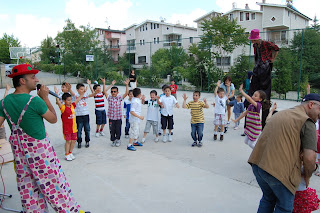Recently, I had the privilege to listen to a high ranking NATO diplomat. I won't disclose his nationality, since that would reveal too much info. Suffice to say that he's pretty high up in NATO hierarchy, and had served as the spokesperson of the Foreign Ministry of his country prior to this post.
For almost half hour, he talked about NATO's Afghanistan mission.
I honestly cannot recall anything of substance from that entire speech.
Except that troop withdrawal is planned by 2014.
Since it seemed impossible to derail the NATO diplomat from his rehearsed lines, I saved my questions for this blog.
Here we go:
Q1: What exactly is NATO's
job definition in Afghanistan?
My educated guess: Establish
stability and
security??
My comment: Good luck with that one!
Stability and security requires a
functional state. What is the grand
strategy to achieve this?
The only two successful cases of
state building through military intervention were
Japan and
Germany. Besides, they had functional, highly effective state apparatuses before being destroyed during WWII. In both cases, state building was not just a military task.
World Bank, then called the
International Bank for Reconstruction and Development, was heavily utilized to rebuild Europe.
In short, NATO in Afghanistan is de facto engaged in
state building. But it is ill-equipped for this task. Furthermore, we don't even know if all the members are content with this "state building" mission...
Q2: What exactly is NATO's
exit strategy in Afghanistan?
My educated guess: Nada!
My comment: We owe this concept largely to Colin Powell, probably the only decent man in GWBush cabinet. The senior NATO diplomat said absolutely nothing about the exit strategy in 2014.
What amazes me the most is, how they come to speak for so long and manage to say absolutely nothing... Hence, is the cartoon below. Sorry if it offends any diplomat admirers...
Lastly, someone in the audience asked the diplomat his opinions of
Arab Spring. He said, "well, each case is very specific, unique to itself..." As a scholar, this kind of statements just spike my blood pressure.
I'm not saying let's rush to lump apples and oranges, but come on. Where is your systematic analysis?
There is either some kind of ignorance or contempt for generalization among the diplomats. They feel like they have to re-invent the wheel at every single incident. Yet, there is a huge literature on
revolutions and
social movements. Political science have not been sleeping over the French, Russian and Iranian revolutions.
Likewise, diplomats seem to completely ignore theoretical approaches in the study of IR and foreign policy. Mostly, they endorse almost an archaic form of realism, that even realists have grown out of, and expect their audience to concur... come on...
Unfortunately, Turkish universities have an old habit of employing retired diplomats as faculty in International Relations departments. This is a huge retrogress for our discipline. If anything, IR scholars should lecture the diplomatic core about the recent theoretical and analytical insights of our discipline.
Diplomats should keep in mind that anecdotes, no matter how interesting they are, do not count as social science.
The diplomat-weary Academic Mommy





